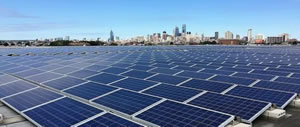World's First Solar Powered Indoor Vertical Farm Comes To Philadelphia
 Steve Hanley for CleanTechnica: It’s always sunny in Philadelphia, according to the title of a popular television show. If so, it’s the perfect place for the world’s first solar powered indoor vertical farm.
Steve Hanley for CleanTechnica: It’s always sunny in Philadelphia, according to the title of a popular television show. If so, it’s the perfect place for the world’s first solar powered indoor vertical farm.
Metropolis Farms has constructed a 500 kilowatt solar array made up of 2003 solar panels on the roof of a building in The City of Brotherly Love. On the fourth floor, it is constructing a vertical farm that will be powered entirely by electricity coming from the roof. It plans to grow the equivalent of 660 outdoor acres worth of crops in less than 100,000 sq feet. “The panels are already installed and turned on, now we’re building out the farm. The first crops will be planted in November,” the company says.
Before Metropolis Farms took over the space, the only things growing on the fourth floor were pigeons. But soon, crops of fresh tomatoes, strawberries, lettuce, herbs, and broccoli will flourish there for the benefit of the citizens of Philadelphia and environs. “We feel this inherently demonstrates the wonder of this new industry we’re helping create, the industry of indoor farming.” Full Article:
Comments (0)
This post does not have any comments. Be the first to leave a comment below.
Featured Product

